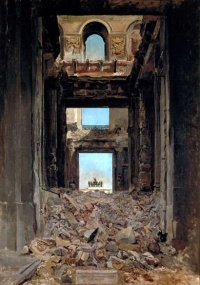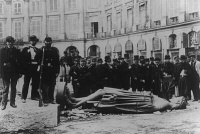French counterculture
From The Art and Popular Culture Encyclopedia
| Revision as of 00:14, 21 July 2007 WikiSysop (Talk | contribs) ← Previous diff |
Current revision Jahsonic (Talk | contribs) |
||
| Line 1: | Line 1: | ||
| + | [[Image:Meissonier Ruins of the Tuileries.jpg|left|thumb|200px|''[[Ruins of the Tuileries]]'' ([[1871]]) by [[Jean-Louis-Ernest Meissonier]]]] | ||
| + | {| class="toccolours" style="float: left; margin-left: 1em; margin-right: 2em; font-size: 85%; background:#c6dbf7; color:black; width:30em; max-width: 40%;" cellspacing="5" | ||
| + | | style="text-align: left;" | | ||
| + | [[Property is theft!]] | ||
| + | |} | ||
| + | [[Image:Communards pose with the statue of Napoléon I from the toppled Vendôme column.jpg|right|thumb|200px|[[Communards pose with the statue of Napoléon I from the toppled Vendôme column]]]] | ||
| {{Template}} | {{Template}} | ||
| - | *[[Waldensians]] | + | This page is about [[French]] [[counterculture]]. |
| - | *[[May 68]] | + | ==Waldensians== |
| + | The '''Waldensians''', '''Waldenses''' or '''Vaudois''' are a [[Christian denomination]] believing in [[poverty]] and [[austerity]], promoting true poverty, public [[preacher|preaching]] and the literal interpretation of the scriptures. They originated in the late 12th century (around [[1173]]) as the ''Poor Men of Lyons'', a band organized by [[Peter Waldo]], a wealthy merchant of [[Lyon]], who gave away his property around [[1176]] and went about preaching apostolic [[poverty]] as the way to perfection. | ||
| - | == See also == | + | They went to [[Rome]], where [[Pope Alexander III]] blessed their life but forbade preaching ([[1179]]) without authorization from the local clergy. They disobeyed and began to teach unorthodox doctrines; they were formally declared [[heresy|heretic]]s by [[Pope Lucius III]] in [[1184]] and by the [[Fourth Lateran Council]] in 1215. In 1211 more than 80 were burned as heretics at [[Strasbourg]], beginning several centuries of [[Persecution of Christians|persecution]]. |
| + | The movement was brutally persecuted during the 12th and 13th centuries and nearly totally destroyed, but the Waldensian Church survives to this day. | ||
| - | *[[French counterculture]] [http://www.google.be/search?hl=nl&q=%22french+counterculture%22&meta= "french counterculture"] | + | Some Waldenses, and other groups seeking to trace their history through the Waldenses, claim that the Waldenses history extends back to the apostolic church, while the mainstream academic view is that the Waldensians were followers of [[Peter Waldo]] (or Valdes or Vaudes). |
| - | **[[French avant-garde]] [http://www.google.be/search?hl=nl&q=%22French+avant-garde%22&meta= "French avant-garde"] | + | |
| - | **[[French underground]] [http://www.google.be/search?hl=nl&q=%22French+underground%22&meta= "French underground"] | + | ==Cathars== |
| + | |||
| + | '''Catharism''' was a name given to a religious sect with [[gnostic]] elements that appeared in the [[Languedoc]] region of [[France]] in the [[11th Century]] and flourished in the [[12th century|12th]] and [[13th century|13th Centuries]]. | ||
| + | |||
| + | Its [[Manichaeism|Manichaean]] theology held that the physical world was [[evil]] and created by [[Satan]], who was taken to be identical with the God of the [[Old Testament]]; and that men underwent a series of [[reincarnation]]s before reaching the pure realm of spirit, the presence of the God of Love described in the [[New Testament]] and his messenger [[Jesus Christ|Jesus]]. | ||
| + | |||
| + | The [[Roman Catholic Church]] regarded the sect as [[heresy|heretical]]; faced with the rapid spread of the movement across the Languedoc and the failure of peaceful attempts at conversion, the Church launched the [[Albigensian Crusade]] to crush the movement. | ||
| + | ==Huguenot== | ||
| + | |||
| + | In the [[16th]] and [[17th]] centuries, the name '''Huguenot''' was applied to a member of the [[Protestant]] Reformed Church of [[France]], historically known as the French [[Calvinism|Calvinists]]. They were a [[French counterculture]] [[avant la lettre]]. Used originally as a [[term of abuse|term of derision]] which the Huguenots [[reclaiming|took up as a badge of honour]], the derivation of the name ''Huguenot'' remains uncertain. The origin of Huguenot beliefs (and perhaps of some of the Huguenots themselves) lies among the [[Cathars]] in the medieval past of the eastern Mediterranean. | ||
| + | ==Notre-Dame Affair== | ||
| + | |||
| + | '''The Notre-Dame Affair''' was an [[anti-clericalism|anti-clericalist]] [[intervention]] performed by members of the radical wing of the [[Lettrist]] movement ([[Michel Mourre]], [[Serge Berna]], [[Ghislain Desnoyers de Marbaix]] and [[Jean Rullier]]), on [[Easter Sunday]], [[April 9]]th [[1950]], at [[Notre Dame de Paris|Notre-Dame Cathedral]] in Paris. Michel Mourre, dressed in the habit of a Dominican [[monk]] and backed by his co-conspirators, chose a quiet moment in the Easter High Mass to climb to the rostrum and declaim before the whole congregation a [[blasphemous]] anti-sermon on the [[death of God]], penned by Serge Berna. | ||
| + | ==Paris Commune== | ||
| + | The [[Paris Commune]] was a [[revolutionary]] and [[socialist]] government that briefly ruled [[Paris]] from 18 March until 28 May 1871. The killing of two French army generals by soldiers of the Commune's National Guard and the refusal of the Commune to accept the authority of the French government led to its harsh suppression by the regular French Army in "''[[La Semaine sanglante]]''" ("The Bloody Week") beginning on 21 May 1871. Debates over the policies and outcome of the Commune had significant influence on the ideas of [[Karl Marx]]. | ||
| + | |||
| + | |||
| + | ==May 68== | ||
| + | |||
| + | '''May 1968''' (in this context usually spelled '''May '68''') is the name given to a series of events that started with a student strike in [[France]]. It turned into a [[general strike]] which paralyzed parts of the country and led to the eventual collapse of the [[de Gaulle]] government. Most of the protesters espoused [[left-wing]] causes, [[communism]] or [[anarchism]], though most mainstream leftist parties distanced themselves from the students and worked with the police and government to end the revolt. Many saw the events as an opportunity to shake up the "old society" in many social aspects, including methods of [[education]], [[sexual freedom]] and [[free love]]. While some of the same leftists who worked against workers and students now call "May '68" a failure from a political point-of-view, it was a significant revolutionary moment in the 20th century. | ||
| + | |||
| + | ==See also== | ||
| + | :''[[European counterculture]]'' | ||
| + | *[[French rock]] | ||
| + | *[[French anarchism]] | ||
| + | *[[Huguenot]] | ||
| + | *[[Cathars]] | ||
| + | *[[Waldensians]] | ||
| + | *[[Notre-Dame Affair]] | ||
| + | *[[May 1968|May 68]] | ||
| + | *''[[L'Aventure hippie]]'' | ||
| + | *''[[Underground, l'histoire]]'' | ||
| + | *[[Zone to Defend]] | ||
| {{GFDL}} | {{GFDL}} | ||
Current revision
|
Related e |
|
Featured: |
This page is about French counterculture.
Contents |
Waldensians
The Waldensians, Waldenses or Vaudois are a Christian denomination believing in poverty and austerity, promoting true poverty, public preaching and the literal interpretation of the scriptures. They originated in the late 12th century (around 1173) as the Poor Men of Lyons, a band organized by Peter Waldo, a wealthy merchant of Lyon, who gave away his property around 1176 and went about preaching apostolic poverty as the way to perfection.
They went to Rome, where Pope Alexander III blessed their life but forbade preaching (1179) without authorization from the local clergy. They disobeyed and began to teach unorthodox doctrines; they were formally declared heretics by Pope Lucius III in 1184 and by the Fourth Lateran Council in 1215. In 1211 more than 80 were burned as heretics at Strasbourg, beginning several centuries of persecution. The movement was brutally persecuted during the 12th and 13th centuries and nearly totally destroyed, but the Waldensian Church survives to this day.
Some Waldenses, and other groups seeking to trace their history through the Waldenses, claim that the Waldenses history extends back to the apostolic church, while the mainstream academic view is that the Waldensians were followers of Peter Waldo (or Valdes or Vaudes).
Cathars
Catharism was a name given to a religious sect with gnostic elements that appeared in the Languedoc region of France in the 11th Century and flourished in the 12th and 13th Centuries.
Its Manichaean theology held that the physical world was evil and created by Satan, who was taken to be identical with the God of the Old Testament; and that men underwent a series of reincarnations before reaching the pure realm of spirit, the presence of the God of Love described in the New Testament and his messenger Jesus.
The Roman Catholic Church regarded the sect as heretical; faced with the rapid spread of the movement across the Languedoc and the failure of peaceful attempts at conversion, the Church launched the Albigensian Crusade to crush the movement.
Huguenot
In the 16th and 17th centuries, the name Huguenot was applied to a member of the Protestant Reformed Church of France, historically known as the French Calvinists. They were a French counterculture avant la lettre. Used originally as a term of derision which the Huguenots took up as a badge of honour, the derivation of the name Huguenot remains uncertain. The origin of Huguenot beliefs (and perhaps of some of the Huguenots themselves) lies among the Cathars in the medieval past of the eastern Mediterranean.
Notre-Dame Affair
The Notre-Dame Affair was an anti-clericalist intervention performed by members of the radical wing of the Lettrist movement (Michel Mourre, Serge Berna, Ghislain Desnoyers de Marbaix and Jean Rullier), on Easter Sunday, April 9th 1950, at Notre-Dame Cathedral in Paris. Michel Mourre, dressed in the habit of a Dominican monk and backed by his co-conspirators, chose a quiet moment in the Easter High Mass to climb to the rostrum and declaim before the whole congregation a blasphemous anti-sermon on the death of God, penned by Serge Berna.
Paris Commune
The Paris Commune was a revolutionary and socialist government that briefly ruled Paris from 18 March until 28 May 1871. The killing of two French army generals by soldiers of the Commune's National Guard and the refusal of the Commune to accept the authority of the French government led to its harsh suppression by the regular French Army in "La Semaine sanglante" ("The Bloody Week") beginning on 21 May 1871. Debates over the policies and outcome of the Commune had significant influence on the ideas of Karl Marx.
May 68
May 1968 (in this context usually spelled May '68) is the name given to a series of events that started with a student strike in France. It turned into a general strike which paralyzed parts of the country and led to the eventual collapse of the de Gaulle government. Most of the protesters espoused left-wing causes, communism or anarchism, though most mainstream leftist parties distanced themselves from the students and worked with the police and government to end the revolt. Many saw the events as an opportunity to shake up the "old society" in many social aspects, including methods of education, sexual freedom and free love. While some of the same leftists who worked against workers and students now call "May '68" a failure from a political point-of-view, it was a significant revolutionary moment in the 20th century.
See also
- French rock
- French anarchism
- Huguenot
- Cathars
- Waldensians
- Notre-Dame Affair
- May 68
- L'Aventure hippie
- Underground, l'histoire
- Zone to Defend



